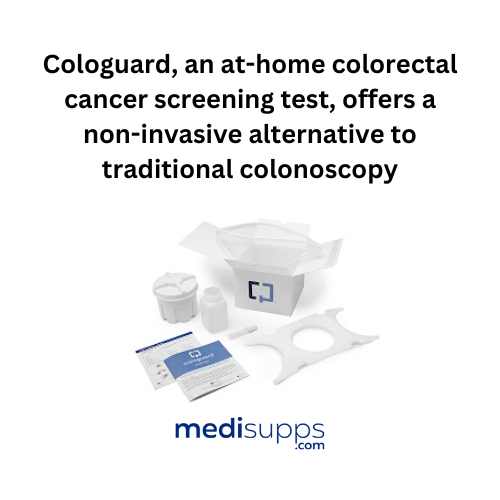
by Russell Noga | Updated December 27th, 2023
Does Medicare Cover Cologuard?
 Colorectal cancer is the third most common cancer in the United States, but early detection and prevention can save lives.
Colorectal cancer is the third most common cancer in the United States, but early detection and prevention can save lives.
With the advent of innovative screening methods like Cologuard, a non-invasive home-based test, navigating the Medicare landscape to understand “Does Medicare cover Cologuard” in terms of coverage and costs becomes crucial.
In this blog post, we’ll explore the ins and outs of Cologuard, its coverage under Medicare, and how to choose the right screening method for you.
Key Takeaways
- Cologuard is a non-invasive colorectal cancer screening test covered by Medicare Part B every 3 years for individuals aged 50-85 with average risk.
- Out of pocket expenses may be applicable depending on insurance coverage and whether the test is considered preventive or diagnostic.
- It is important to communicate effectively with healthcare providers, utilize insurance agents, and use Medicare resources in order to make informed decisions about Cologuard screenings.
Understanding Cologuard: A Brief Overview
Colorectal cancer, also known as colon cancer, is a type of colorectal disease that affects millions of people worldwide and is the second leading cause of cancer-related deaths in the United States.
 Early detection is vital in improving health outcomes and reducing cancer deaths. Cologuard, an at-home colorectal cancer screening test, offers a non-invasive alternative to traditional colonoscopy.
Early detection is vital in improving health outcomes and reducing cancer deaths. Cologuard, an at-home colorectal cancer screening test, offers a non-invasive alternative to traditional colonoscopy.
By analyzing stool samples for DNA mutations, blood traces, and genetic markers, Cologuard can help identify early signs of developing colorectal cancer, including hereditary nonpolyposis colorectal cancer, and potentially save lives.
Cologuard is designed for average-risk individuals aged 50 and older who do not exhibit symptoms of colorectal cancer.
The test requires a prescription from a healthcare provider and includes a kit containing all necessary materials for collecting and shipping the stool sample to a laboratory for analysis.
According to the American Cancer Society, 90% of new cases of colon and rectal cancer occur in individuals aged 50 and above, emphasizing the importance of regular screenings for this age group.
Developed by Exact Sciences, Cologuard has gained popularity among Medicare beneficiaries as a convenient and non-invasive option for colorectal cancer screening.
With updated colorectal cancer screening guidelines recommending Cologuard as a viable alternative to traditional colonoscopy, understanding Medicare’s coverage of this test has become increasingly important.
The Science Behind Cologuard
 Cologuard, a stool DNA test, is based on the principle of detecting specific DNA markers and blood in stool samples. Colorectal cancer and precancerous polyps can shed abnormal DNA and blood into the digestive tract, which eventually makes its way into the stool.
Cologuard, a stool DNA test, is based on the principle of detecting specific DNA markers and blood in stool samples. Colorectal cancer and precancerous polyps can shed abnormal DNA and blood into the digestive tract, which eventually makes its way into the stool.
By analyzing these markers, Cologuard can help identify the presence of colorectal cancer or precancerous growths.
To use Cologuard, a prescription is required from a healthcare provider. The test kit includes everything necessary to collect a stool sample, which is then shipped to a laboratory for analysis.
Cologuard is primarily recommended for individuals between the ages of 50 and 85 who have no personal or family history of colorectal cancer, adenomatous polyps, or inflammatory bowel disease.
One critical aspect to bear in mind is that Cologuard is not a diagnostic test. Instead, it serves as a preventive diagnostic tool to identify the likelihood of colorectal cancer.
A positive result from Cologuard indicates the need for further diagnostic testing, such as a colonoscopy, to confirm the presence of cancer or precancerous growths.
View Rates for 2024
Enter Zip Code
Cologuard vs. Colonoscopy
To fully grasp the benefits and drawbacks, a comparison between Cologuard and the traditional colonoscopy should be made.
A colonoscopy is an outpatient procedure where a physician examines the interior of the gastrointestinal system using a colonoscope.
While it is considered the gold standard for colorectal cancer screening, the invasiveness and discomfort associated with colonoscopy can deter some individuals from undergoing the procedure.
Cologuard, on the other hand, offers a non-invasive and convenient alternative. With a reported accuracy of 92% in detecting colorectal cancer, Cologuard is a viable option for those who may not be suitable for or prefer to avoid a colonoscopy.
However, despite Cologuard’s convenience, the colonoscopy stands as the most accurate method, with over 95% detection of all colorectal cancers.
The frequency of testing also differs between Cologuard and colonoscopy. Cologuard is recommended every three years, while colonoscopy is advised every 10 years.
Ultimately, the choice between Cologuard and colonoscopy should be based on an individual’s risk factors, preferences, and discussions with their healthcare provider.
Medicare’s Coverage of Cologuard
Medicare plays a significant role in covering the costs associated with Cologuard and other colorectal cancer screenings.
Understanding the specifics of Medicare coverage can help beneficiaries make informed decisions about their care and minimize out-of-pocket expenses.
Here are the key points regarding Medicare coverage for Cologuard:
- Medicare Part B covers Cologuard tests every 3 years as a preventive service.
- This coverage is applicable to individuals with an average risk of colorectal cancer.
- The coverage is available for individuals aged between 50 and 85.
By knowing these details, Medicare beneficiaries can take advantage of the coverage and ensure they receive the necessary screenings for colorectal cancer.

Eligibility for Medicare’s coverage of Cologuard depends on specific criteria, including age, risk factors, and the absence of colorectal cancer symptoms. Beneficiaries should consult their healthcare providers about their eligibility and coverage options to guarantee optimal care and minimize possible costs.
Medicare Part B and Cologuard
Medicare Part B covers Cologuard as a preventive service for eligible individuals, with no cost-sharing for the test itself.
This means that beneficiaries who meet the eligibility requirements can access Cologuard without any out-of-pocket expenses, such as deductibles or copayments. Keep in mind that Medicare Part B covers Cologuard exclusively as a preventive service, not as a diagnostic tool.
If a beneficiary receives a positive Cologuard test result, any subsequent diagnostic procedures, such as a follow-up colonoscopy, may be subject to cost-sharing. This includes deductibles, copayments, or coinsurance, depending on the specific Medicare plan.
Understanding the distinction between preventive and diagnostic services for Cologuard can help beneficiaries anticipate potential costs and make informed decisions about their care.
Frequency of Cologuard Coverage
Medicare provides Cologuard tests to individuals aged 50-85 who are at an average risk of colorectal cancer. These tests are available once every three years.
 This frequency reflects the American Cancer Society’s recommendations and acknowledges the importance of regular screenings for early detection and prevention.
This frequency reflects the American Cancer Society’s recommendations and acknowledges the importance of regular screenings for early detection and prevention.
Beneficiaries who meet the eligibility requirements can access Cologuard without any out-of-pocket expenses as a preventive service under Medicare Part B.
Beneficiaries should consult their healthcare providers about the appropriate frequency of Cologuard testing, taking into account personal risk factors and the general colorectal cancer screening guidelines.
Understanding the frequency of Medicare coverage for Cologuard can help beneficiaries make informed decisions about their care and ensure they receive the best possible coverage.
Costs Associated with Cologuard and Medicare
Cologuard tests typically cost between $400 and $600 without insurance coverage.
However, Medicare insurance may fully cover the cost of the test if it is considered a preventive service. Beneficiaries should acquaint themselves with their insurance coverage and any possible out-of-pocket costs related to Cologuard and other colorectal cancer screenings.
Additional costs may apply if a polyp is found during the procedure, such as a follow-up colonoscopy or other diagnostic measures. These costs may include deductibles, copayments, or coinsurance, depending on the specific Medicare plan.
Understanding the various costs associated with Cologuard and Medicare can help beneficiaries make informed decisions about their care and minimize potential expenses.
Out-of-Pocket Expenses
Out-of-pocket expenses for Cologuard may vary depending on insurance coverage and whether the test is considered preventive or diagnostic. When Cologuard is classified as a preventive service, Medicare covers the full cost of the test without any out-of-pocket expenses for the beneficiary.
However, if a follow-up diagnostic procedure is required, such as a colonoscopy, the beneficiary may be responsible for cost-sharing in the form of deductibles, copayments, or coinsurance.
It is of utmost importance for beneficiaries to familiarize themselves with their insurance coverage and potential out-of-pocket expenses linked to Cologuard and other colorectal cancer screenings.
Communicating with healthcare providers and insurance agents can help clarify coverage options and minimize potential costs.
Medicare Supplement and Advantage Plans’ Role in Cologuard Coverage
 Medicare Supplement (Medigap) and Advantage plans play a role in covering costs associated with Cologuard and other colorectal cancer screenings.
Medicare Supplement (Medigap) and Advantage plans play a role in covering costs associated with Cologuard and other colorectal cancer screenings.
While Original Medicare (Part A and Part B) provides coverage for Cologuard as a preventive service, Medicare Supplement and Advantage plans may offer additional benefits or coverage options for beneficiaries, making it important to understand how Medicare covers Cologuard.
Understanding the role of Medicare Supplement and Advantage plans in covering Cologuard and other colorectal cancer screenings can help beneficiaries make informed decisions about their care and minimize potential out-of-pocket expenses.
Medigap Plans and Cologuard
Medigap plans generally cover costs for preventive colorectal cancer screenings, including Cologuard, with no additional cost to the beneficiary.
These plans supplement Original Medicare coverage and can help cover expenses that Original Medicare does not pay, such as coinsurance, copayments, and deductibles.
Beneficiaries should review their Medigap plan details and consult either their healthcare provider or a licensed insurance agent to find out if their plan covers Cologuard and other colorectal cancer screenings.
Understanding the specific coverage provided by Medigap plans and Medicaid services can help beneficiaries make informed decisions about their care and minimize potential out-of-pocket expenses.
Medicare Advantage Plans and Cologuard
Medicare Advantage plans are an alternative way to receive Medicare coverage and often include additional benefits not provided by Original Medicare, such as:
- Prescription drug coverage
- Vision coverage
- Hearing coverage
- Dental coverage
- Wellness coverage
These plans cover preventive screening tests like Cologuard, but diagnostic procedures may require payment of scheduled copays or coinsurance.
Beneficiaries must grasp their Medicare Advantage plan’s coverage of Cologuard and other colorectal cancer screenings.
Communicating with healthcare providers, insurance agents, and Medicare resources can help clarify coverage options and minimize potential out-of-pocket costs.
Alternative Colorectal Cancer Screenings Covered by Medicare
In addition to Cologuard, Medicare covers various alternative colorectal cancer screenings, such as the fecal occult blood test (FOBT), sigmoidoscopy, and barium enema.
These screenings offer beneficiaries options for early detection and prevention of colorectal cancer, depending on their individual risk factors and preferences.
Understanding the range of colorectal cancer screenings covered by Medicare can help beneficiaries make informed decisions about their care and ensure they receive the best possible coverage and health outcomes.
Choosing the Right Screening Method
 The choice of the right colorectal cancer screening method is influenced by personal risk factors, comfort level, and insurance coverage.
The choice of the right colorectal cancer screening method is influenced by personal risk factors, comfort level, and insurance coverage.
Beneficiaries should discuss these factors with their healthcare providers to establish the screening method that best suits their needs.
Some individuals may prefer a non-invasive screening method like Cologuard, while others may opt for a more comprehensive and accurate test like a colonoscopy.
Factors such as age, family history, and personal medical history can influence the recommended screening method and frequency.
Each screening method comes with its own benefits and drawbacks, making it vital to consider these aspects and make an informed decision through consultation with a healthcare provider.
Regular colon cancer screening and early detection can significantly improve health outcomes and reduce the risk of colorectal cancer.
Navigating Medicare Coverage for Cologuard: Tips and Resources
The process of navigating Medicare coverage for Cologuard can be simplified through communication with healthcare providers, using insurance agents, and accessing Medicare resources.
These resources can help beneficiaries understand their coverage options, potential out-of-pocket costs, and ensure they receive the best possible care and coverage for Cologuard and other colorectal cancer screenings.
Staying informed and proactive in discussing colorectal cancer screening options with healthcare providers and insurance agents enables beneficiaries to maximize their Medicare coverage and prioritize their health and well-being.
By following the recommendations of the Preventive Services Task Force, individuals can ensure they are taking the necessary steps to safeguard their health.
Communicating with Healthcare Providers
 Conversations with healthcare providers about Cologuard and other colorectal cancer screening options form a crucial step towards making informed decisions about care.
Conversations with healthcare providers about Cologuard and other colorectal cancer screening options form a crucial step towards making informed decisions about care.
Healthcare providers can offer guidance on the most appropriate screening method based on individual risk factors and preferences, as well as provide information on insurance coverage and potential costs.
Beneficiaries should feel empowered to ask questions, express concerns, and seek clarification from their healthcare providers about Cologuard and other colorectal cancer screenings.
Open communication can lead to a better understanding of the available options and the best course of action for each individual.
Utilizing Insurance Agents and Medicare Resources
Beneficiaries can gain a better understanding of their coverage options and potential out-of-pocket costs for Cologuard and other screenings with the help of licensed insurance agents and Medicare resources. These professionals can provide information on:
- insurance coverage
- in-network providers
- pre-authorization requirements
- cost-sharing options
This information can help minimize out-of-pocket expenses.
By utilizing these resources and seeking advice from knowledgeable professionals, beneficiaries can make informed decisions about their care and coverage for Cologuard and other colorectal cancer screenings.
Summary
In summary, Cologuard is an innovative and non-invasive colorectal cancer screening option covered by Medicare for eligible beneficiaries.
Understanding the specifics of Medicare coverage, as well as the roles of Medicare Supplement and Advantage plans, can help individuals make informed decisions about their care.
By communicating with healthcare providers, utilizing insurance agents, and accessing Medicare resources, beneficiaries can ensure they receive the best possible coverage and care for Cologuard and other colorectal cancer screenings.
Get Quotes Now
Enter Zip Code
Frequently Asked Questions
What does Medicare pay for cologuard?
Original Medicare Part B covers Cologuard screenings at no cost, and Medicare Advantage also covers it without any copays or deductibles. Other screening stool DNA tests remain nationally non-covered, so check with your insurance plan for these tests.
How much does the cologuard stool test cost?
The Cologuard stool test costs around $500, although some insurance plans may cover part of that cost depending on your plan, co-pay, and deductible. Screening colonoscopies typically have no out-of-pocket costs for patients.
How often does insurance pay for cologuard?
Insurance typically covers Cologuard every 3 years for those 45 to 85 years old without symptoms or increased risk of colorectal cancer. Flexible sigmoidoscopy can be performed every 4 years, but not within 10 years of a previous colonoscopy.
What is the Medicare loophole for colonoscopy?
The “Medicare loophole” for colonoscopy occurs when a routine screening detects medical issues, resulting in the test no longer being considered free and instead becoming a diagnostic procedure requiring 20% coinsurance.
How much does colonoscopy cost?
The cost of a colonoscopy can range between $1,250 and $4,800, with an average cost of $2,750 nationally. New Health Choice notes that the price may differ based on the setting of the procedure, with an average cost of $2,550.
Find the Right Medicare Plan for You
Finding the right Medicare Plan 2024 doesn’t have to be confusing. Whether it’s a Medigap plan, or you want to know if Medicare covers Cologuard, we can help.
Call us today at 1-888-891-0229 and one of our knowledgeable, licensed insurance agents will be happy to assist you!

Russell Noga is the CEO and Medicare editor of Medisupps.com. His 15 years of experience in the Medicare insurance market includes being a licensed Medicare insurance broker in all 50 states. He is frequently featured as a featured as a keynote Medicare event speaker, has authored hundreds of Medicare content pages, and hosts the very popular Medisupps.com Medicare Youtube channel. His expertise includes Medicare, Medigap insurance, Medicare Advantage plans, and Medicare Part D.


